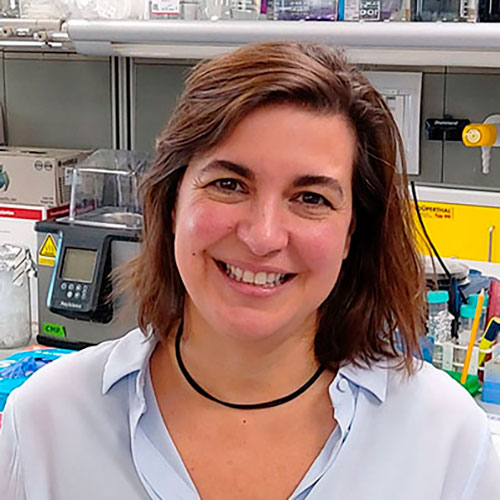
Facultyseminar: When cancer cells don’t die: links between metabolic stress, inflammation and cachexia
Cristina Muñoz-Pinedo
Preclinical and experimental research in thoracic tumors group
23/05/2025
13:00-14:00
Aula Blava
Resum
Glucose and oxygen deficiency frequently occur during tumorigenesis. However, tumors can adapt by restoring blood flow through neoangiogenesis. We analyzed responses of tumor cells to starvation, which included cell death (in acute settings) and the secretion of cytokines and inflammatory factors that rewire immune context. Moreover, cells subjected to glucose limitation or hypoxia, but not other conditions of metabolic stress, secrete LIF, an IL-6 family cytokine implicated in the development of solid tumors and cachexia. LIF release was prevented by mannose, which sustained multiple metabolic pathways in the absence of glucose. LIF release was associated to impairment of N-glycosylation and activation of MEK MAP kinases. In mouse models of non small cell lung carcinoma (NSCLC), reduction of LIF impaired angiogenesis and tumor growth, rewired the immune system towards an anti-tumor phenotype, and impaired implantation of tumors in the lung. In patients with NSCLC, LIF mRNA correlates with hypoxia and angiogenesis. Moreover, the presence of LIF and other IL-6 family cytokines in serum associates with the development of cachexia. Therefore, LIF is one of the factors produced by hypoxic/hypoglycemic cells that could be targeted to impair angiogenesis, immune suppression and tumor growth.
Hosted by Ruth Rodriguez Barrueco – Breast Cancer group
Biografia
Group leader, Preclinical and experimental research in thoracic tumors Bellvitge Biomedical Research Institute (IDIBELL), L’Hospitalet de Llobregat, Spain.
Cristina Muñoz-Pinedo’s lab focuses on tumor responses to starvation and inhibition of cancer metabolism. C. Muñoz-Pinedo started her scientific career in cell death signaling and its crosstalk with metabolism under the supervision of Dr. Abelardo López-Rivas at CSIC in Granada, Spain. She then worked under the supervision of Doug Green at the La Jolla Institute for Allergy and Immunology, where she studied the role of the mitochondria during cell death as an initiator of the apoptotic process and as a “victim” of caspase activation. After a short stay in St. Jude Children’s Research Hospital, in 2006 she moved back to Spain to start a lab whose main interest is to understand how cells cope with starvation. In the “Preclinical and experimental research in thoracic tumors” group, C. Muñoz-Pinedo together with Ernest Nadal lead a team that applies the knowledge on cell death, cancer metabolism and responses to starvation to improve the treatment of lung cancer and mesothelioma.
